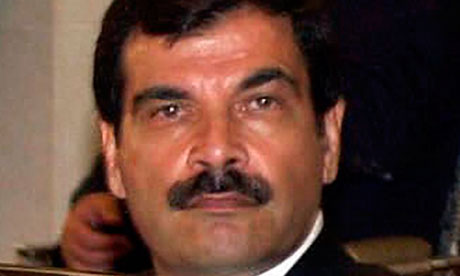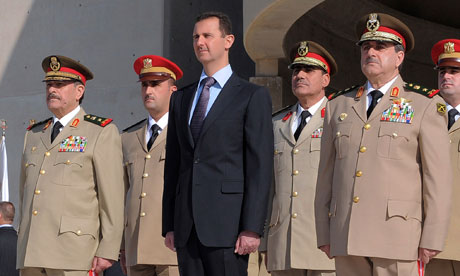Leading Syrian regime figures killed in Damascus bomb attack
Rebels kill Bashar al-Assad's brother-in-law, defence minister and other key figures in Damascus

Assef Shawkat, brother-in-law of the
Syrian leader, Bashar al-Assad, who has been killed by a rebel bomb in
Damascus. Photograph: AFP/Getty Images
Syria's
uprising has entered a dramatic new phase as rebels fighting the regime
of Bashar al-Assad killed three of his top security chiefs in a
devastating bomb attack in the heart of Damascus.
Syrian state TV
confirmed the death of Assef Shawkat, Assad's brother-in-law and the
deputy head of the armed forces, and his closest security adviser, as
well as Dawoud Rajha, the minister of defence and the regime's most
senior Christian figure. Hassan Turkmani, its crisis management chief,
was also killed.
Several other key figures, including the interior
minister, Mohammed Shaar, were wounded and being treated in the
capital's al-Shami hospital.

Explosions were also reported from
the headquarters of the army's 4th division in Damascus – the regime's
elite unit commanded by Assad's brother Maher.
Sergei Lavrov,
Russia's foreign minister, said a "decisive battle" had begun in Syria.
Lavrov also made clear Moscow would oppose a draft UN security council
resolution threatening punishment if Assad did not implement the
UN-backed peace plan promoted by Kofi Annan.
The attack on the
headquarters of Syria's national security council in the al-Rawda area
was the most audacious yet by anti-Assad rebels, who have been fighting
sporadically in parts of the capital for the past four days.
It
was not clear whether it was a suicide bombing but it was rumoured that
the suspected killer may have been a bodyguard for Rajha or another
member of Assad's inner circle. But one pro-regime source in Damascus
told the Guardian it was possible that a bomb could have planted on the
premises.
The attack was a deadly blow to the heart of the regime
after two recent high-level defections – by a senior Republican Guard
commander and Syria's ambassador to Iraq.
Syrian state TV said
foreign-backed "terrorists" had carried out the attack. The country's
armed forces said in a statement that Syria was "more determined than
ever to confront all forms of terrorism and chop off any hand that harms
national security".
Syrian state TV also reported that the
military would on Thursday morning call up its reserve forces.
Replacements for the three dead men were quickly announced.
Rumours
spread wildly in the hours after the incident and information was
impossible to verify. According to one pro-government source rebels of
the Free Syrian Army (FSA) started moving around in pick-up trucks to
show they controlled parts of the city. Ba'ath party members had been
executed by FSA men, the source said.
There were also widespread
reports of defections in many areas of Syria including central Damascus
as well as Homs and Hama. Activists reported that several tanks had been
abandoned near the centre of the capital and that several combat units
had defected en masse. These reports could not be independently
confirmed.
Shawkat, married to Assad's sister Bushra, was one of
the most feared figures in the president's inner circle and had won the
support of the clan's influential matriarch, Anisa. He was one of three
central figures in the regime crackdown, along with Assad himself and
his brother Maher. As Syria's overall security chief, he had key input
into all military and intelligence operations. He is known to have
survived an attempt to poison him in late May when a cook contaminated
food that had been prepared for him and key members of the national
security ministry.
Abu Hamza of the Free Syrian Army told the
Guardian at the time that rebel forces were trying to recruit aides of
regime figures to carry out future attacks. "We have had some success
with this," he said. "Some have been with us for a long time and have
not yet been given orders to move."
Shawkat had also been a key
point-man with Iran and with Hezbollah. Since the uprising started he
had chaired key strategy meetings and had driven the regime's
uncompromising and aggressive military response to the escalating
dissent.
Rajha, a former general, was appointed defence minister
last year in an apparent attempt to emphasise the inclusiveness of the
Alawite-dominated regime.
Prospects for any kind of negotiation between the government and rebels – always slim – have now disappeared.
Pro-regime
Syrians appeared shocked by the news. "A lot of pro-Assad people are
really panicking," said an opposition activist. "Now they sound really
nervous."
Assad supporters admitted the attack was a serious blow.
"This will not be the end of the regime in any way," said one member of
Assad's Alawite community. "But it is serious and people are
traumatised at the fact that the opposition managed to assassinate these
people. But government supporters want the government to be firm and
show it is still in control. The Syrian government is not usually
impulsive."
http://www.guardian.co.uk

Comments
Post a Comment